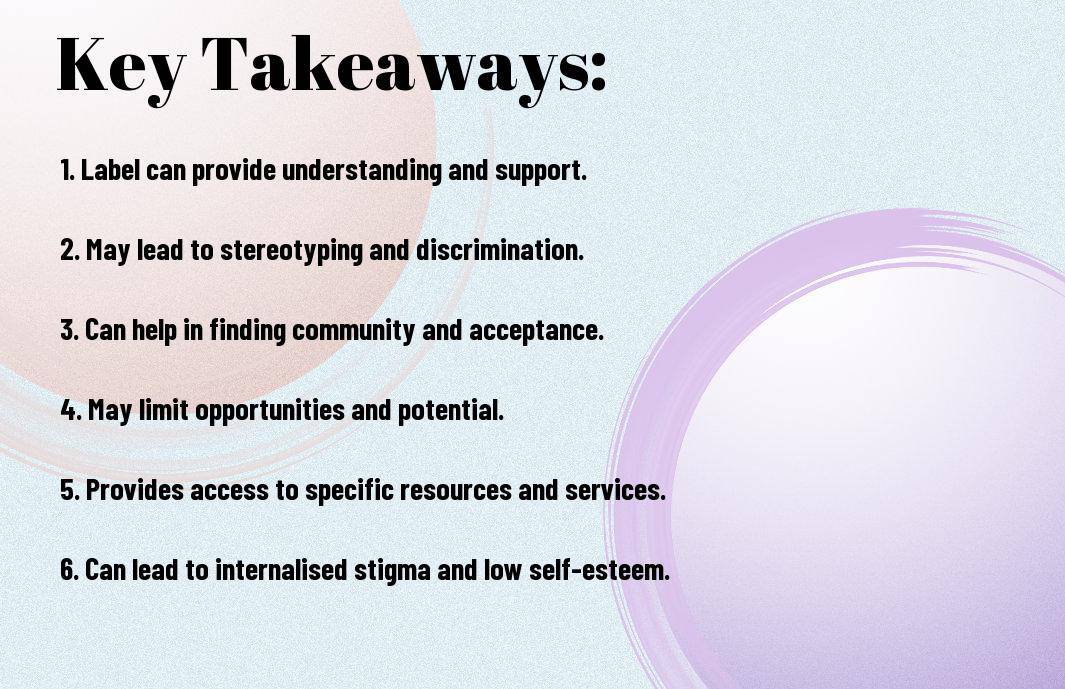Heterogeneous views abound within the autism community regarding the utility of labels and the impact on individual identity. Understanding the complex interplay between these factors is crucial for informed decision-making. Embracing an autism label can provide access to vital support services and resources, while reinforcing a sense of community and belonging. However, the process of labelling can also bring with it stigmatization and stereotyping, potentially overshadowing an individual’s unique identity. In this blog post, we aim to explore the nuances of the autism label and its impact on personal identity, providing a balanced overview of the opportunities and challenges it presents for individuals on the autism spectrum.
Key Takeaways:
- Benefits of Labels: Autism labels can provide access to necessary support services and accommodations, increasing understanding and acceptance in society.
- Limitations of Labels: Labels can lead to stereotypes and discrimination, potentially limiting opportunities for individuals with autism and shaping their self-identity.
- Individual Autonomy: It is important to consider each individual’s perspective on whether they want to embrace or reject the autism label, allowing for autonomy in shaping their own identity.
Understanding Autism Labels
Definition and History of Autism Labels
Autism labels refer to the various terms and classifications used to describe individuals on the autism spectrum. The history of autism labels dates back to the early 20th century, with the first recognized description of autism by Dr. Leo Kanner in 1943. Over the years, the terminology used to label individuals with autism has evolved, reflecting changes in understanding and perceptions of the condition.
Understanding the evolution of autism labels is crucial in recognising the impact and implications of the language used to describe individuals on the autism spectrum. It is important to acknowledge the historical context of autism labels and how they have shaped societal attitudes and perceptions towards autism.
The Language of Autism: Terms and Usage
The language used to describe autism has evolved alongside changing attitudes and understanding of the condition. Terms such as “high-functioning” and “low-functioning” have been commonly used to categorise individuals on the autism spectrum, but these labels can be misleading and stigmatizing. More recently, there has been a shift towards person-first language, such as “person with autism” as opposed to “autistic person”, to emphasise the individual behind the label.
It is crucial to be aware of the impact of the language used to describe autism, as it can influence how individuals on the spectrum are perceived and treated. By being mindful of the terms and usage surrounding autism labels, we can strive towards creating a more inclusive and respectful environment for individuals on the autism spectrum.


The Pros of Autism Labels
Empowerment and Identity Formation
Embracing the label of autism can be empowering for individuals, as it provides a sense of identity and belonging within the autistic community. Recognising one’s autism can lead to a greater understanding of oneself and foster a positive sense of self-acceptance and pride.
By embracing the label, individuals can find strength in their unique way of experiencing the world, and can connect with others who share similar experiences. This can lead to a greater sense of empowerment and confidence in navigating the world as an autistic individual.
Enhancing Access to Support and Resources
Identifying with the label of autism can also enhance access to support and resources that are specifically tailored to the needs of autistic individuals. This can include specialised therapies, educational accommodations, and community services that are designed to address the unique challenges and strengths associated with autism.
Embracing the label of autism can lead to a greater awareness of available resources, and can facilitate access to the necessary support systems for individuals to thrive. This can ultimately lead to improved quality of life and well-being for autistic individuals.
It is important for autistic individuals to have access to these resources and support systems, as they play a crucial role in enabling individuals to reach their full potential and lead fulfilling lives. By embracing the label of autism, individuals can more effectively access the support and resources that are specifically designed to meet their needs.
Facilitating Communication and Awareness
Identifying with the label of autism can also facilitate communication and raise awareness about autism within society. By openly acknowledging one’s autism, individuals can contribute to a greater understanding of the diversity within the autistic community and challenge stigmatising perceptions and stereotypes.
This can lead to improved acceptance and inclusion of autistic individuals in various social, educational, and professional settings, as well as increased awareness of the unique contributions and perspectives that autistic individuals bring to the world. Embracing the label of autism can therefore promote positive change and foster a more inclusive society.
Raising awareness about autism and promoting understanding of diverse communication styles can help create a more inclusive and accepting society for autistic individuals. Embracing the label of autism can contribute to this important work of building a more autism-friendly world.

The Cons of Autism Labels
Potential for Stigmatization and Misunderstanding
One of the main downsides of autism labels is the potential for stigmatization and misunderstanding. When individuals are labelled as autistic, they may face discrimination and prejudice from others who hold misconceptions about autism. This can lead to social isolation and a lack of opportunities for those with autism, which is detrimental to their well-being and development.
Moreover, the stigma associated with autism labels can also impact the individual’s self-esteem and mental health. They may internalise negative stereotypes and feel ashamed of their diagnosis, leading to feelings of inadequacy and low self-worth.
The Limitation of Individual Diversity
Another downside of autism labels is the limitation of individual diversity. By categorising individuals under a single label, we run the risk of overlooking the unique strengths, challenges, and experiences of each person with autism. This can lead to a narrow understanding of autism and hinder efforts to tailor support and interventions to the specific needs of individuals.
Furthermore, the focus on the label of autism may overshadow other aspects of an individual’s identity, neglecting their diverse interests, talents, and personality traits.
It is crucial to recognise the complexity and individuality of each person with autism, rather than confining them to a singular label.
Issues with Label Persistence and Evolution
Autism labels also present issues with persistence and evolution. As the understanding and diagnosis of autism continue to evolve, individuals may face challenges in adapting to changing labels and definitions. This can be confusing and frustrating for individuals and their families, as well as for professionals working in the field.
Additionally, the persistence of outdated or inaccurate labels can pose barriers to accessing appropriate support and services, as well as hindering research and advancements in the field of autism.
It is crucial to acknowledge the fluidity and complexity of autism, and to ensure that labels and diagnoses keep pace with current knowledge and understanding.
Personal and Societal Perspectives
When it comes to autism, the use of labels can be a contentious issue. Some individuals see great value in identifying as ‘autistic’, viewing it as a fundamental part of their identity. Others prefer to use person-first language, such as ‘having autism’, to emphasise the individual behind the diagnosis. In ‘Autistic Vs. Having Autism: The Importance of Labels’, we explore the significance of these labels and how they can impact personal and societal perspectives Read More.
Individual Experiences with Autism Labels
For many individuals on the autism spectrum, the label they use to describe themselves can have a profound impact on their sense of identity. Some feel empowered by embracing their ‘autistic’ identity, finding a sense of community and understanding among others who share the label. On the other hand, those who prefer ‘having autism’ may emphasise the importance of person-first language in recognising their individuality and capabilities. Both perspectives reflect the complexity of personal experiences with autism labels and the diversity within the autism community.
The Role of Society and Culture in Labeling
Society and culture play a significant role in shaping how autism is labelled and perceived. Cultural attitudes towards autism can influence whether individuals feel comfortable identifying as ‘autistic’ or ‘having autism’. Additionally, societal understanding of these labels can impact access to support services and accommodations. It is crucial to acknowledge the influence of societal and cultural norms on the experiences of individuals on the autism spectrum.
Understanding the impact of societal and cultural perspectives on autism labels is essential for promoting inclusive and respectful language within our communities. By recognising the diverse perspectives and the complexity of individual experiences, we can create a more supportive and accepting environment for all individuals on the autism spectrum.
The Pros and Cons of Autism Labels and Identity
In conclusion, the debate over autism labels and identity is a complex and multifaceted issue. On one hand, labels can provide individuals with a sense of identity and community, as well as access to appropriate support and resources. However, they can also lead to stigma and discrimination, and may limit the individual’s potential by imposing narrow expectations and stereotypes. It is important for society to recognise and respect the diverse experiences and perspectives of individuals with autism, and to strive for a balance between acknowledging the unique challenges and strengths associated with autism, while also celebrating the individual’s autonomy and agency. Ultimately, the decision to embrace or reject a label should be left to the individual, and society should work towards creating a more inclusive and accepting environment for all.
FAQ
Q: What are the pros and cons of using autism labels and identity?
A: Using autism labels can help individuals access support and understanding, but it can also lead to stigma and misconceptions.
Q: How can autism labels benefit individuals with autism?
A: Autism labels can help individuals with autism access targeted support services, accommodations, and understanding from others.
Q: What are the potential drawbacks of using autism labels?
A: Using autism labels may lead to misconceptions, stigma, and negative stereotypes, which can impact self-esteem and opportunities for individuals with autism.
Q: What is the impact of autism labels on identity?
A: For some individuals, embracing an autism identity can foster a sense of community and empowerment, while for others, it may lead to feelings of exclusion or limitation.
Q: How can professionals support individuals with autism in navigating labels and identity?
A: Professionals can provide accurate information, address misconceptions, and empower individuals with autism to make their own choices about labels and identity.
Q: What strategies can help mitigate the negative effects of autism labels?
A: Educating others, promoting acceptance and inclusion, and focusing on individual strengths and abilities can help reduce the negative impact of autism labels.
Q: How can society promote a more inclusive and supportive environment for individuals with autism, regardless of labels?
A: By promoting understanding, embracing neurodiversity, and advocating for equal opportunities, society can create a more inclusive and supportive environment for individuals with autism.







